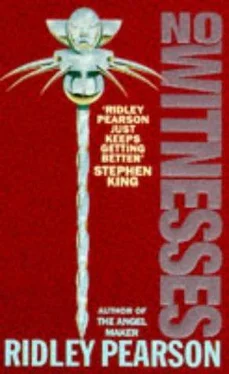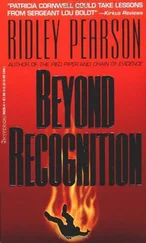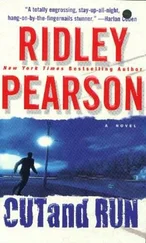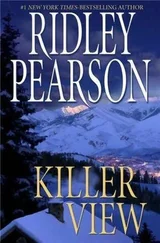Ridley Pearson - No Witnesses
Здесь есть возможность читать онлайн «Ridley Pearson - No Witnesses» весь текст электронной книги совершенно бесплатно (целиком полную версию без сокращений). В некоторых случаях можно слушать аудио, скачать через торрент в формате fb2 и присутствует краткое содержание. Жанр: Триллер, на английском языке. Описание произведения, (предисловие) а так же отзывы посетителей доступны на портале библиотеки ЛибКат.
- Название:No Witnesses
- Автор:
- Жанр:
- Год:неизвестен
- ISBN:нет данных
- Рейтинг книги:4 / 5. Голосов: 1
-
Избранное:Добавить в избранное
- Отзывы:
-
Ваша оценка:
- 80
- 1
- 2
- 3
- 4
- 5
No Witnesses: краткое содержание, описание и аннотация
Предлагаем к чтению аннотацию, описание, краткое содержание или предисловие (зависит от того, что написал сам автор книги «No Witnesses»). Если вы не нашли необходимую информацию о книге — напишите в комментариях, мы постараемся отыскать её.
No Witnesses — читать онлайн бесплатно полную книгу (весь текст) целиком
Ниже представлен текст книги, разбитый по страницам. Система сохранения места последней прочитанной страницы, позволяет с удобством читать онлайн бесплатно книгу «No Witnesses», без необходимости каждый раз заново искать на чём Вы остановились. Поставьте закладку, и сможете в любой момент перейти на страницу, на которой закончили чтение.
Интервал:
Закладка:
Lately, the other squads seemed to have the luck. David Pasquini’s squad was batting an unbelievable mid-80s, and this with a couple of knucklehead detectives on his squad. Pasquini was strutting around like a peacock these days. Boldt, on the other hand, was spending a lot of time out of the office.
Bringing an absolute surefire black hole to the lieutenant at a time like this was asking for it. But Boldt needed that case number. Shoswitz was having a tough ride with a bad case of hemorrhoids that everyone on the fifth floor knew about.
“You have that fucking look in your eye,” Shoswitz said. His office was decorated in baseball memorabilia and cheap trophies. He had big brown eyes, a narrow face, and the anxious movements of a used-car salesman. His shirt collar was a half size too big.
“I’ve got a live one. I need a case number for the second floor.”
“Evidence? Don’t tell me someone in your squad actually came up with some evidence!” He moved around the room judiciously.
Boldt saw Wednesday’s paper on a chair. He opened it to page 7 and spread it on Shoswitz’s desk, tapping the article. Shoswitz read.
“Adler Foods has received some convincing threats. Part of the demands include our staying out of it,” Boldt observed.
“Adler Foods is huge,” Shoswitz said, the concern very real in his voice.
“There’s the very real possibility that these illnesses are our criminal’s way of making himself be taken seriously.”
“So we keep it out of the Book,” Shoswitz observed.
“I’d like to be detailed,” Boldt said, requesting he be assigned solely to this one investigation and his other responsibilities reassigned.
“I can justify that.” Shoswitz was not going to fight him, was not going to nag him about clearance rates or internal politics. He was, in effect, throwing himself to the lions, and doing so without complaint or comment.
“You’ll want LaMoia and Gaynes, so I’ll give the squad over to Danielson. That should starch some shorts.” Danielson was a newcomer to Boldt’s Homicide squad, and not particularly well liked, though he had earned the support and respect of his sergeant and lieutenant.
“How long can we sit on it?” Boldt asked.
“A day or two. Rankin will have to be told eventually, and by then, you’ll have to have something more than this,” he said, pointing at the newspaper.
“This is one time I’d really like to be wrong,” Boldt said honestly.
A patrolman knocked on Shoswitz’s door and opened it, informing Boldt that the lab had just called up for him.
The lieutenant and sergeant met eyes, and the lieutenant said plaintively, “Tell Bernie it’s not going in the Book. He has a problem with that, he can call me.”
The lab smelled medicinal, with a hint of cordite and the bitter taste of shorting electricity.
Lofgrin’s glasses gave him eyes that looked like boiled eggs sliced in half. He had an oily face and wild hair-what was left of it.
“I need to know if any of the jars or cans had been tampered with,” Boldt said, following at a brisk pace across the lab.
“The jars are out,” Lofgrin declared, explaining, “we would need the lids to detect tampering. Probably would miss it even then. The cans,” he said, pointing ahead, “are a different story.”
“Can you test the jars for cholera?”
“Can, and will. But it won’t be today. And honestly, we’re unlikely to get much of anything. The bacteria will not survive in a dry jar. Even in the soup, it has a shelf life of only a few days at the outside. But obviously, we’ll still try. An early jump won’t help with these.”
“When?”
“Eight to ten working days. Five days at the earliest; two weeks at the outside.”
Weeks? Boldt wondered. He grabbed Lofgrin by the arm, pulled him aside, and spoke in a whisper. “It’s not going in the Book, Bernie. It’s one of those . I don’t have weeks.”
Lofgrin searched Boldt’s eyes and then fixed his attention on Boldt’s tight grip, which loosened immediately. He said, “We may be able to get some help with this. First, let’s see what we’ve got , okay?”
“We’ve got two down that we know of. Alive, but not well.”
“Understood.”
They each took a seat on a stool in front of the lab counter where Boldt’s prized evidence-two soup cans and a spaghetti jar-awaited them. A loose-leaf reference manual lay open alongside. “The labels match. No forgery or nothing; they’re the real thing. Dimensions, too,” he added, tapping the reference book. “Got the specs on everything from Milky Ways to Lean Cuisine in here. Adler uses the same size can for all his soups.”
“You dusted them,” Boldt said, noticing the white smudges on the outside of the cans.
“Dusted one, but I’ll fume the others,” Lofgrin said, referring to SuperGlu fumes that had been used for the last decade to develop latent prints on surfaces that offered difficult imaging. “Nothing of interest,” he added. “Smudges. Let’s check ’em for continuity,” Lofgrin delivered in his most professorial tone.
His initial inspection of the cans’ surfaces was accomplished with a magnifying glass. “Seems archaic,” Lofgrin said, “I know.” He used the glass carefully and methodically, rotating the can slowly beneath a strong light. When he placed the glass down and clipped a special set of magnifiers to his glasses, Boldt asked him, “Got something?”
“Hmm,” Lofgrin answered, pushing his face to the can. “May be.” Carrying the can, he led Boldt to an elaborate instrument that turned out to be a microscope. He spent several minutes setting it up. Then, spinning the can slowly, he raised the piggybacked pair of glasses and pressed his greasy face to the black rubber viewfinder. Boldt instinctively stepped closer. Lofgrin said to the machine, “Hello there!”
“Bernie?”
He said softly, “There’s a solder plug in the seam.” He reached up and spun a dial without taking his eyes away. “It’s small. Couple millimeters is all. Carefully done. The color is off. FDA outlawed the use of lead in seams some time ago. They’re all a ferrous-based alloy now. This plug shows up despite the attempts to sand it smooth and blend it into the seam.”
Lofgrin looked up.
“It would have been beneath-that is hidden by-the label. Drill it, inject whatever your pleasure, plug it, reapply the label, and you’ve got one hell of a surprise. We detect the lead or the flux in a chromatograph, if I’m right.”
“Tampered?” Boldt asked.
He offered Boldt a look. Magnified to twenty times its normal size, Boldt could make out the slightly discolored plug of gray metal surrounded by obvious scratch marks from sanding.
“Hiding his work like that-that’s thinking,” Lofgrin said.
Boldt did not want to face someone so thought-out.
“Blackmail?” Lofgrin asked.
Boldt nodded. “That’s why it’s not going in the Book.”
“Drilling tin cans and plugging them with solder. You find this Tin Man, I gotta think he’s got some kind of background in microbiology or chemistry. Might be a jeweler. Might be in electronics.” It was customary to invent nicknames. Boldt’s stomach turned with the image of a person hunched over a soup can and injecting it with a hypodermic needle.
He poked the can with his pen. “This is what I’m looking for? A soup can that looks like every other soup can?”
“I’m a big help, aren’t I? That’s what they pay me for.”
Boldt did not want to face a grocery store full of food-shelves stacked high with cans, any one of which might be poisoned-but that was where he was now headed: the Foodland supermarket on Broadway.
Читать дальшеИнтервал:
Закладка:
Похожие книги на «No Witnesses»
Представляем Вашему вниманию похожие книги на «No Witnesses» списком для выбора. Мы отобрали схожую по названию и смыслу литературу в надежде предоставить читателям больше вариантов отыскать новые, интересные, ещё непрочитанные произведения.
Обсуждение, отзывы о книге «No Witnesses» и просто собственные мнения читателей. Оставьте ваши комментарии, напишите, что Вы думаете о произведении, его смысле или главных героях. Укажите что конкретно понравилось, а что нет, и почему Вы так считаете.












